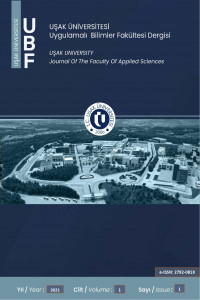DIŞ TİCARETTE KORUMACILIK VE KORONAVİRÜS SALGIN DÖNEMİNDE TÜRKİYE’DE İHRACATIN DURUMU
Koronavirüs salgın döneminde ülkelerin ihracat ve ithalat trendleri birçok açıdan etkilenmiştir. Kapanmanın olduğu dönemde daralan ekonomiler, düşen güven endeksleri ve yükselen gıda fiyatları endeksi yaşanan ortak ekonomik sorunlar arasında sayılabilir. Türkiye’de yaşanan bu küresel salgından olumsuz bir şekilde etkilenmiştir. Koronavirüs salgını dünya genelinde korumacı ticaret politikaları açısından yeni bir döneme girilmesine neden olmuştur. Salgın öncesi dönemde ABD-Çin ticaret savaşları şeklinde korumacılığın söz konusu olduğu bilinmekle birlikte salgın dönemi zorunlu kapanmalarla devam etmiştir. İhracat yasaklarının küresel değer zincirlerini göz ardı ettiği bilinmesine rağmen bu yasaklar uygulanmıştır.
Anahtar Kelimeler:
İhracat, Koronovirüs Salgını, Korumacılık
Protection in Foreign Trade and Export in Turkey during the Coronavirus Epidemic
During the coronavirus epidemic period, the export and import trends of countries have been affected in many ways. Contracting economies, falling confidence indices and rising food prices index during the closure period can be counted among the common economic problems experienced. The coronavirus epidemic has led to a new era in terms of protectionist trade policies around the world. Although it is known that there was protectionism in the form of US-China trade wars in the pre-epidemic period, the epidemic period continued with mandatory closures. Although it is known that export bans ignore other global chains, these bans have been implemented.
Keywords:
Export, Coronovirus Epidemic, Protectionism,
___
- Aktaş,A, (2021),”Kur artınca ihracat ta artıyor öyle mi?”,Dünya Gazetesi,26 Ekim 2021.
- Bown, C. P. (2020). Covid-19: Demand spikes, export restrictions, and quality concerns imperil poor country access to medical supplies. R. Baldwin and J. Evenett, Simon (Ed.). COVID-19 and Trade Policy: Why Turning Inward Won’t Work içinde (ss.31-49). Washington: CEPR Press.
- ISL (2020). Covid-19 and international trade: Issues and actions from drawing on data from innovative solutions in maritime logistics. www.isl.org/en/containerindex.
- IATA (2020). International air transport association. https://www.iata.org/.
- Çakmak, K. H. (2004). Stratejik dış ticaret politikaları. Akdeniz Üniversitesi İktisadi ve İdari Bilimler Fakültesi Dergisi, 4(7), 48-66.
- Çavuş, Z. (2014). Orta gelir tuzağı: Türkiye örneği. (Yayınlanmamış Yüksek Lisans Tezi). İnönü Üniversitesi Sosyal Bilimler Enstitüsü, Malatya.
- Eğilmez, M. (2021). Kendime yazılar, https://www.mahfiegilmez.com/.
- Exports By Country (2021). https://worldpopulationreview.com/.
- Hizmet İhracatçıları Birliği (2021). https://www.hib.org.tr/.
- Simon, E. and Johannes, F. (2020). Collateral damage: Cross-border fallout from pandemic policy overdrive. https://voxeu.org/article/cross-border-fallout-pandemic-policy-overdrive.
- Soleymani, S. (2014). Gelişmekte olan ülkelerin kalkınmasında çok uluslu şirketlerin etkisi. (Yayınlanmamış Yüksek Lisans Tezi). Atatürk Üniversitesi Sosyal Bilimler Enstitüsü, Erzurum.
- Stellinger, A., Berglund, I. and Isakson, H. (2020). How trade can fight the pandemic and contribute to global health. . Baldwin and J. Evenett, Simon (Ed.). Covid-19 and Trade Policy: Why Turning
- Inward Won’t Work içinde (ss. 21-31). Washington: CEPR Press.
- Sözcü Gazetesi, 2 Kasım 2020.
- TİM (2021). https://tim.org.tr/tr/default.
- TÜİK (2021), https://data.tuik.gov.tr/Bulten/Index?p=Dis-Ticaret-Endeksleri.
- TCMB (2021). http://tcmb.gov.tr/TCMB Güncesi.
- World Poulation Review (2021). https://worldpopulationreview.com/country-rankings/exports-by-country.
- WTO (2020). Export Prohibitions and Restrictions, Information Note. https://www.wto.org/english/tratop_e/covid19_e/export_prohibitions_report_e.pdf.
- Başlangıç: 2021
- Yayıncı: Uşak Üniversitesi
Sayıdaki Diğer Makaleler
KATILIM BANKALARI VE TÜRKİYE’DEKİ İLGİLİ MUHASEBE MEVZUATININ İNCELENMESİ
Ayşe Nilgün ERTUĞRUL, Yağmur KÜÇÜKŞAHİN
DÖVİZ KURLARININ UŞAK DERİ SANAYİ İŞLETMELERİNİN İHRACAT PERFORMANSINA ETKİSİ
Ercan ÖZEN, Ahmet Eren YILDIRIM
BİLGİ İLETİŞİM TEKNOLOJİLERİNİN EKONOMİK BÜYÜMEYE ETKİSİ
DIŞ TİCARETTE KORUMACILIK VE KORONAVİRÜS SALGIN DÖNEMİNDE TÜRKİYE’DE İHRACATIN DURUMU
